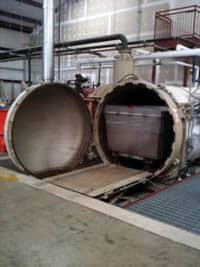Continued Improvements in the Medical Waste Disposal Industry
Continued Improvements in the Medical Waste Disposal Industry
 Ever since medical waste was discovered along busy beaches many decades ago, regulating these hazardous items has been a priority. State and federal authorities, along with scientific professionals, continue to evaluate today’s handling protocols. They suggest improvements as discoveries arise. Get to know the details of the medical waste disposal industry and how these experts continuously strive for safety.
Ever since medical waste was discovered along busy beaches many decades ago, regulating these hazardous items has been a priority. State and federal authorities, along with scientific professionals, continue to evaluate today’s handling protocols. They suggest improvements as discoveries arise. Get to know the details of the medical waste disposal industry and how these experts continuously strive for safety.
The Incineration Standard
Before 1997, medical waste disposal regulations centered around the incineration process. Every item that could be incinerated was destroyed with emissions floating out into the atmosphere. There wasn’t any cause for concern until scientists evaluated the air quality around these plants. Although incineration is still a standard in the medical waste disposal industry, polluting the air isn’t part of the process anymore.
Burning the waste offers countless benefits to the public. The items are no longer a contamination threat. No significant waste is left behind. Disposal professionals must be aware of any byproducts that impact the environment afterward, such as the control of possible emissions.
Alternative Protocols
Incinerating the waste isn’t the only option. Advanced techniques have emerged over the years. Microwave technology is a possibility under current medical waste disposal regulations. The microwaves neutralize the waste molecules so that they aren’t harmful anymore. Using electro-pyrolysis is a similar treatment that employs high temperatures and controlled oxygen levels to eradicate organic molecules on soiled items, from fabrics to plastics.
Autoclaving is still a viable process where steam creates a sterile environment. Chemical treatments might be chosen as well. Most processors, however, strive for the cleanest treatment options. Steam and incineration tend to be the most popular choices.
Entering the Landfills
Medical waste disposal does include landfill use in some cases. Processors use their chosen method of sterilization. The experts test the leftover items for any harmful substances. With a thorough treatment, the items should be entirely clean. The handlers package the items up for transport to a local landfill. Depending on the landfill’s rules, those items might be added to a specific area.
Current regulations protect the public from any exposure to those harmful substances. Treating and disposing of the waste in local landfills is approved with strict attention to the processing details. In the future, there may be further rules that make the process even safer than before.
Concerning Self Transport
You might work in a small clinic. These facilities have a very low volume of medical waste. It’s understandable that these entities may want to transport their own waste. Avoid this workplace complication, however. Even small waste volumes must still be transported with strict guidelines in place.
If you transport more than 50 pounds of waste, the regulations are even more stringent. Carefully consider the ramifications of improper transport and potential harm to the environment. Professionals should oversee your medical waste.
Working with Medical Waste Disposal Industry Professionals
Take the worry out of waste transport with industry professionals. They show up at your facility with the proper vehicle and containers. The experts empty each waste container so that the items remain sealed off from the public. You receive a certificate of receipt for your records. The experts transport the items to their processing facility. You avoid any worries about spillage or needle pricks when the professionals contracted for your facility.
When you need a company that follows all medical waste disposal regulations, contact MedSharps for a quote. These professionals keep up with the latest trends. They only employ best practices and maintain their processing machines. Working in the medical waste disposal industry requires attention to safety details for impeccable service.








